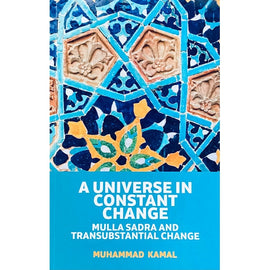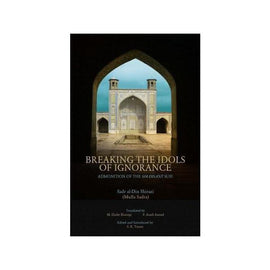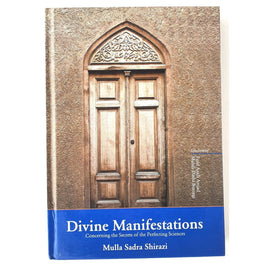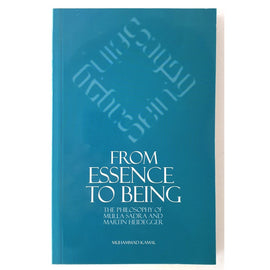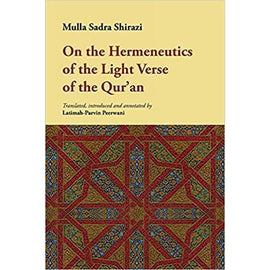Filter
- All Items
- 0-5 Yrs old
- 12th Imam
- 13+ Years old
- 2-8 Years old
- 3+ Years old
- 3-12 Yrs Old
- 4-10 Yrs Old
- 40 Sufi Comics
- 41 Sufi Comics
- 5-12 Yrs Old
- 6-12 yrs old
- 7+ Years
- 7-15 Year old
- A Study of polytheism and idolatory in Quran
- Abbas
- Abbas Qummi
- activity
- Adalah
- Afghan
- Ahlul kisaa
- aimmah
- akhlaaq
- Al Mizan
- Al-ansari
- Al-Ghadeer
- al-Karamah
- Ali Musawi
- Allama Al-Hilli
- Allamah Tabatabai
- Amili
- Amini
- Amoli
- An Outline of Islamic Thought in the Qur'an (PBK)
- Animals
- Antropology
- Arabic
- Arastu
- arbaeen
- Ashrura
- Ashura
- Attar
- Ayatollah Makarem Shirazi
- Ayyashi
- Bahjat
- Bahmanpour
- Baligha Resources
- Banners
- Baqir As Sadr
- Bedtime
- beginners guide
- Beliefs
- Bidaya
- Bihar
- bioethics
- Biography
- Board books
- Bukhari
- Business
- chapter book
- Chiristmas
- Christianity
- Christmas
- clock
- Coffee Table Book
- Coloring Book
- Colour Coded
- Colouring
- Colouring Book
- comic
- Commentary
- Commercial law
- Conflict management
- Contemporary issues
- Cue Cards
- cup
- Curriculum
- Daily supplication
- Dastaghaib
- Death
- Democracy
- Development
- Diet
- digital age
- Download
- Dua
- Early years
- Economics
- education
- Ehawza
- ethics
- Fables
- Fadhlullah
- Faghfoory
- Family
- Farsi
- Fasting
- Fatima Zahraa
- Fiqh
- Fitrah
- Game
- Games
- Gender roles
- germs
- Ghurar al Hikam
- Governance
- Grade 1
- Grade 2
- Grief
- Guide
- Hadith
- Hadith Collections
- Hajj
- Hajj & Wilayah
- Hamid Algar
- hard cover
- hawza
- Hijab
- Hilli
- history
- Holy Prophet
- Human rights
- Hurr al-Amili
- Husayn
- ibn Arabi
- Ibn Tawus
- Ihtijaj
- Ijtihad
- illustrated
- Imam Ali
- Imam Askari
- Imam Hadi
- Imam hassan and Husain
- Imam Husain
- Imam Jawad
- Imam Kadhim
- Imam Khomaini
- Imam Mahdi
- Imam Reda
- Imam Sadiq
- Imam Sajjad
- Imamah
- imams
- infallibles
- Inheritance
- Introduction
- Introduction to Hadith
- Introduction to Islam
- Introductory Islam
- Iraq
- Irawani
- Irfan
- Isa
- Islam
- islamic
- Islamic Government
- Islamic History
- Islamic Revolution
- Ja'far Subhani
- Ja'fariyan
- Jabir Al-Ansari
- Jesus
- Justice
- Kafi
- Karbala
- Kawthar
- KG
- Khamenai
- Khamenei
- Khoja
- Khomaini
- Khums
- Kids
- Kids books
- Kisa
- Knowing God
- Kulayni
- language development
- Lantern
- Law
- Leadership
- led sound cups
- Lessons of life
- Life
- life after death
- logic
- love
- Ma'rifat
- Mabadi
- Mafatih
- Management
- Manual
- Maqtal
- Marriage
- Martin Heidegger
- mathnawi
- Medicine
- Memorisation
- Memory matching
- Mental Health
- message
- MH Shakir
- MiladunNabi
- Misbah Yazdi
- Misc Issues
- Misconceptions
- Modern
- morality
- Mortgage
- mubahala
- Mufid
- Muharram
- Mukhtar
- Mulla Sadra
- Mullah Asghar
- mums
- Mutahhari
- Mutahhari Theology Series
- mysticism
- nahjul Balagah
- Namaaz
- Nasr
- nature
- New muslims
- Nihaya
- Novel
- Occultation
- Panahian
- Parenting
- Parents
- Pashtun
- Philosophy
- Pishvai
- Play
- Pluralism
- Poetry
- Politics
- Posters
- Practical Laws
- Praying
- PRE-K
- Prophet
- Prophets
- purpose
- Qa'im
- Qazwini
- Quli Qarai
- Qur'anic Studies
- Quran
- Quran activity
- Quran reading
- Quranic Sciences
- Quranic Stories
- Ramadan
- Ramadhan
- Rayshahri
- reason
- Religious pluralism
- Resurrection
- Rumi
- Saadi
- Sadr
- Sahifa
- Sahifa Mahdi
- Salaah
- Salaat
- Salah
- Salman
- Sarf
- Sayyida Zainab
- science
- Science of Jurisprudence
- Sciences
- Secrets of Divine Love
- Self Control
- Self Help
- sentences
- Sex
- Shahadah
- Shaheed
- ShahrRamadhan
- shares
- Shi'i Hagiography
- Shia
- Shia Belifs
- Shia Islam - Origins
- shia-sunni
- Shining Sun: In Memory of ‘Allamah Tabataba’i
- shipping
- Shi‘a Sects (Kitab Firaq al-Shi‘a)
- Shomali
- Sistani
- Soleimani
- spiritual
- Spiritual Mysteries and Ethical Secrets
- Spiritual Psychology: The Fourth Intellectual Journey in Transcendent Philosophy (PBK)
- Spiritual Season
- Spirituality
- Spirituality of the Shi'ism and other Discourses
- Spouse selection
- stocks
- Stories
- Stories of the Prophets
- Story of the martyr
- Student Edition
- Sufi Comics
- Sunan An Nabi
- Supplication
- Supplications
- Tabari
- Tabatabai
- Tabrasi
- Tafsir
- Tafsir: Qur'anic Exegesis
- Tajweed
- Tasbih
- Tawheed Al-Mufadhdhal
- Teacher Edition
- Teaching
- Textbook
- The Divine Invitation
- The event of Taff- The Earliest historical account of the tragedy of Karbala
- The Faith of Imami Shi'ah
- The Last Journey - Manazilul Aakhirah
- The Last Luminary and Ways to Delve into the Light
- The Message
- The Misty Land of Ideas and the Light of Dialogue (HBK)
- The Misty Land of Ideas and the Light of Dialogue (PBK)
- The Prophet's Attitude Towards Children and Youth
- The Sacred Effusion- Reflection on Ziyarat Ashura Vol 1
- The Sacred Effusion- Reflection on Ziyarat Ashura Vol 2
- The Shore Aurora
- The Spread of Islam: The Contributing Factors
- The Story of Nabi Yusuf as
- The untold reality of Karbala
- The Ways of the Righteous
- The Wise Fool of Baghdad - Sufi Comics
- thematic
- Then I was guided
- Theological Anthropology
- Theology
- Theology (Volume 1)
- Theory of knowledge (ICHS)
- thology
- tihrani
- Tijiani
- Training and Education in Islam (ICHS)
- Translation
- Transliteration
- Transubstantial Motion and the Natural World
- Tusi
- Umra
- Unwan Basri
- upbringing
- Urdu
- Usul al Fiqh
- Vilayat
- Wahid Khorasani
- War and peace
- Water
- Wiladah
- Wilayat Faqih
- Will
- wisdom
- Women
- Workbook
- World view
- Wudhu
- Yasin
- Yemen
- young adult
- Young adults
- Ziyarah
Products
{"id":8020746535190,"title":"A Universe in Constant Change: Mulla Sadra and Transubstantial change","handle":"a-universe-in-constant-changee-mulla-sadra-and-transubstantial-change","description":"\u003cp\u003e\u003cstrong\u003eMulla Sadra Shirazi (c. 1571\/2 – 1640) \u003c\/strong\u003eis universally recognised as the most preeminent Muslim philosopher of the past five centuries. This book is an interpretation of one of the central themes of Mulla Sadra’s philosophy of existence, known as ‘transubstantial change’. It provides, for the first time in English, a comprehensive analysis of transubstantial change in light of Sadrian ontology and its impact on some philosophical issues such as identity, values, and truth. As the author elucidates, in transubstantial change, nothing is indestructible, and everything in the world, including substance, is in constant renewal.\u003cbr\u003e\u003cbr\u003eMuhammad Kamal is a senior lecturer at the Faculty of Arts at the University of Melbourne. He has written extensively on the thoughts and ideas of Hegel, Heidegger, and Mulla Sadra. He is also the author of Mulla Sadra’s Transcendent Philosophy (2006), and From Essence to Being: The Philosophy of Mulla Sadra and Martin Heidegger (2010).\u003c\/p\u003e","published_at":"2022-11-22T18:01:04+11:00","created_at":"2022-11-22T18:01:05+11:00","vendor":"ICAS PRESS","type":"Books","tags":["Mulla Sadra"],"price":3600,"price_min":3600,"price_max":3600,"available":true,"price_varies":false,"compare_at_price":null,"compare_at_price_min":0,"compare_at_price_max":0,"compare_at_price_varies":false,"variants":[{"id":43792136175894,"title":"Default Title","option1":"Default Title","option2":null,"option3":null,"sku":"","requires_shipping":true,"taxable":true,"featured_image":null,"available":true,"name":"A Universe in Constant Change: Mulla Sadra and Transubstantial change","public_title":null,"options":["Default Title"],"price":3600,"weight":400,"compare_at_price":null,"inventory_quantity":3,"inventory_management":"shopify","inventory_policy":"deny","barcode":"","requires_selling_plan":false,"selling_plan_allocations":[]}],"images":["\/\/www.shiabooks.com.au\/cdn\/shop\/products\/A-Universe-in-Constant-Change-Cover.jpg?v=1669179150"],"featured_image":"\/\/www.shiabooks.com.au\/cdn\/shop\/products\/A-Universe-in-Constant-Change-Cover.jpg?v=1669179150","options":["Title"],"media":[{"alt":null,"id":32223848792342,"position":1,"preview_image":{"aspect_ratio":1.0,"height":571,"width":571,"src":"\/\/www.shiabooks.com.au\/cdn\/shop\/products\/A-Universe-in-Constant-Change-Cover.jpg?v=1669179150"},"aspect_ratio":1.0,"height":571,"media_type":"image","src":"\/\/www.shiabooks.com.au\/cdn\/shop\/products\/A-Universe-in-Constant-Change-Cover.jpg?v=1669179150","width":571}],"requires_selling_plan":false,"selling_plan_groups":[],"content":"\u003cp\u003e\u003cstrong\u003eMulla Sadra Shirazi (c. 1571\/2 – 1640) \u003c\/strong\u003eis universally recognised as the most preeminent Muslim philosopher of the past five centuries. This book is an interpretation of one of the central themes of Mulla Sadra’s philosophy of existence, known as ‘transubstantial change’. It provides, for the first time in English, a comprehensive analysis of transubstantial change in light of Sadrian ontology and its impact on some philosophical issues such as identity, values, and truth. As the author elucidates, in transubstantial change, nothing is indestructible, and everything in the world, including substance, is in constant renewal.\u003cbr\u003e\u003cbr\u003eMuhammad Kamal is a senior lecturer at the Faculty of Arts at the University of Melbourne. He has written extensively on the thoughts and ideas of Hegel, Heidegger, and Mulla Sadra. He is also the author of Mulla Sadra’s Transcendent Philosophy (2006), and From Essence to Being: The Philosophy of Mulla Sadra and Martin Heidegger (2010).\u003c\/p\u003e"}
You may also like:
A Universe in Constant Change: Mulla Sadra and Transubstantial change
$36.00
Mulla Sadra Shirazi (c. 1571/2 – 1640) is universally recognised as the most preeminent Muslim philosopher of the past five centuries....
{"id":8760562438,"title":"Breaking the Idols of Ignorance: Admonition of the Soi-Distant Sufi","handle":"breaking-the-idols-of-ignorance-admonition-of-the-soi-distant-sufi","description":"\u003cp\u003eAre false mystics and impious sophists a modern phenomenon? Not according to Mulla Sadra Shirazi, the famous 17th century mystical philosopher who rebukes the pretentious by instructing the faithful on what it truly means to be pious. A brilliant synthesis of the Islamic philosophical, mystical, and theological traditions, this work stresses sincere virtues and spiritual exercises.\u003c\/p\u003e\n\u003cp\u003eOne of the greatest philosophers in Islamic history, Mulla Sadra (1571-1636) founded the transcendental school of philosophy (also known as al-hikmah al-muta‘aliyah). Born in Shiraz, Iran, he taught philosophy for many years under the auspices of the Safavid government before retiring to the village of Kahak for a fifteen-year retreat. During this time, he formulated his signature approach to philosophy, theology, hadith, and Qur’anic exegesis – an approach which remains influential to the present day.\u003c\/p\u003e","published_at":"2016-10-14T15:12:39+11:00","created_at":"2016-10-14T15:12:39+11:00","vendor":"ICAS PRESS","type":"Books","tags":["Mulla Sadra"],"price":2900,"price_min":2900,"price_max":2900,"available":true,"price_varies":false,"compare_at_price":null,"compare_at_price_min":0,"compare_at_price_max":0,"compare_at_price_varies":false,"variants":[{"id":31343502726,"title":"Default Title","option1":"Default Title","option2":null,"option3":null,"sku":"","requires_shipping":true,"taxable":true,"featured_image":null,"available":true,"name":"Breaking the Idols of Ignorance: Admonition of the Soi-Distant Sufi","public_title":null,"options":["Default Title"],"price":2900,"weight":500,"compare_at_price":null,"inventory_quantity":4,"inventory_management":"shopify","inventory_policy":"deny","barcode":"","requires_selling_plan":false,"selling_plan_allocations":[]}],"images":["\/\/www.shiabooks.com.au\/cdn\/shop\/products\/Breaking-the-Idols-of-Ignorance-Admonition-of-the-Soi-Distant-Sufi.jpg?v=1632634707"],"featured_image":"\/\/www.shiabooks.com.au\/cdn\/shop\/products\/Breaking-the-Idols-of-Ignorance-Admonition-of-the-Soi-Distant-Sufi.jpg?v=1632634707","options":["Title"],"media":[{"alt":"Breaking the Idols of Ignorance: Admonition of the Soi-Distant Sufi-Shia Books","id":20916667547726,"position":1,"preview_image":{"aspect_ratio":1.0,"height":666,"width":666,"src":"\/\/www.shiabooks.com.au\/cdn\/shop\/products\/Breaking-the-Idols-of-Ignorance-Admonition-of-the-Soi-Distant-Sufi.jpg?v=1632634707"},"aspect_ratio":1.0,"height":666,"media_type":"image","src":"\/\/www.shiabooks.com.au\/cdn\/shop\/products\/Breaking-the-Idols-of-Ignorance-Admonition-of-the-Soi-Distant-Sufi.jpg?v=1632634707","width":666}],"requires_selling_plan":false,"selling_plan_groups":[],"content":"\u003cp\u003eAre false mystics and impious sophists a modern phenomenon? Not according to Mulla Sadra Shirazi, the famous 17th century mystical philosopher who rebukes the pretentious by instructing the faithful on what it truly means to be pious. A brilliant synthesis of the Islamic philosophical, mystical, and theological traditions, this work stresses sincere virtues and spiritual exercises.\u003c\/p\u003e\n\u003cp\u003eOne of the greatest philosophers in Islamic history, Mulla Sadra (1571-1636) founded the transcendental school of philosophy (also known as al-hikmah al-muta‘aliyah). Born in Shiraz, Iran, he taught philosophy for many years under the auspices of the Safavid government before retiring to the village of Kahak for a fifteen-year retreat. During this time, he formulated his signature approach to philosophy, theology, hadith, and Qur’anic exegesis – an approach which remains influential to the present day.\u003c\/p\u003e"}
You may also like:
Breaking the Idols of Ignorance: Admonition of the Soi-Distant Sufi
$29.00
Are false mystics and impious sophists a modern phenomenon? Not according to Mulla Sadra Shirazi, the famous 17th century mystical...
{"id":8760562502,"title":"Divine Manifestations: Concerning the Secrets of the Perfecting Sciences Hard cover","handle":"divine-manifestations-concerning-the-secrets-of-the-perfecting-sciences-pbk","description":"\u003cp\u003eDivine Manifestations (Al-Mazahir al-Ilahiyyah fi Asrar al-‘Ulum al-Kamaliyyah) is Mulla Sadra’s final work on divine metaphysics. He wrote it in order to elucidate a new rational theology in which he demonstrated the most controversial topics in Islamic theology. Although he does not explicitly refer to orthodox Islamic theologians’ approaches, his book is replete with indirect criticism and commentary on the deficiency of their methods. In this book, he discusses the existence of God, His attributes, His acts, and the Resurrection as well as the nature of the non-material worlds. His approach is both philosophical and textual, in that he bases his discussion on verses of the Holy Qur’an as well as hadith. It is a valuable work for anyone interested in knowing how in a systematic method of rational thinking, philosophy, theology and religion harmoniously and rationally can meet one another.\u003c\/p\u003e\n\u003cp\u003eSadr al-Din Shirazi, known as Mulla Sadra (1571-1640), is the principal figure of the major revival of philosophy in Iran in the sixteenth and seventeenth centuries. He is perhaps the single most important and influential philosopher in the Muslim world for the last four hundred years. He authored over forty works including his magnum opus, the seminal al-Asfar in nine volumes, the Qur’anic commentary and a critical commentary on the Shi‘i hadith collection, Usul al-Kafi.\u003c\/p\u003e","published_at":"2016-10-14T15:12:39+11:00","created_at":"2016-10-14T15:12:39+11:00","vendor":"ICAS PRESS","type":"Books","tags":["Mulla Sadra"],"price":4100,"price_min":4100,"price_max":4100,"available":true,"price_varies":false,"compare_at_price":null,"compare_at_price_min":0,"compare_at_price_max":0,"compare_at_price_varies":false,"variants":[{"id":31343502790,"title":"Default Title","option1":"Default Title","option2":null,"option3":null,"sku":"","requires_shipping":true,"taxable":true,"featured_image":null,"available":true,"name":"Divine Manifestations: Concerning the Secrets of the Perfecting Sciences Hard cover","public_title":null,"options":["Default Title"],"price":4100,"weight":500,"compare_at_price":null,"inventory_quantity":2,"inventory_management":"shopify","inventory_policy":"deny","barcode":"","requires_selling_plan":false,"selling_plan_allocations":[]}],"images":["\/\/www.shiabooks.com.au\/cdn\/shop\/products\/Divine-Manifestations-Concerning-the-Secrets-of-the-Perfecting-Sciences-Hard-cover.jpg?v=1632634714"],"featured_image":"\/\/www.shiabooks.com.au\/cdn\/shop\/products\/Divine-Manifestations-Concerning-the-Secrets-of-the-Perfecting-Sciences-Hard-cover.jpg?v=1632634714","options":["Title"],"media":[{"alt":null,"id":20916667646030,"position":1,"preview_image":{"aspect_ratio":1.0,"height":1414,"width":1414,"src":"\/\/www.shiabooks.com.au\/cdn\/shop\/products\/Divine-Manifestations-Concerning-the-Secrets-of-the-Perfecting-Sciences-Hard-cover.jpg?v=1632634714"},"aspect_ratio":1.0,"height":1414,"media_type":"image","src":"\/\/www.shiabooks.com.au\/cdn\/shop\/products\/Divine-Manifestations-Concerning-the-Secrets-of-the-Perfecting-Sciences-Hard-cover.jpg?v=1632634714","width":1414}],"requires_selling_plan":false,"selling_plan_groups":[],"content":"\u003cp\u003eDivine Manifestations (Al-Mazahir al-Ilahiyyah fi Asrar al-‘Ulum al-Kamaliyyah) is Mulla Sadra’s final work on divine metaphysics. He wrote it in order to elucidate a new rational theology in which he demonstrated the most controversial topics in Islamic theology. Although he does not explicitly refer to orthodox Islamic theologians’ approaches, his book is replete with indirect criticism and commentary on the deficiency of their methods. In this book, he discusses the existence of God, His attributes, His acts, and the Resurrection as well as the nature of the non-material worlds. His approach is both philosophical and textual, in that he bases his discussion on verses of the Holy Qur’an as well as hadith. It is a valuable work for anyone interested in knowing how in a systematic method of rational thinking, philosophy, theology and religion harmoniously and rationally can meet one another.\u003c\/p\u003e\n\u003cp\u003eSadr al-Din Shirazi, known as Mulla Sadra (1571-1640), is the principal figure of the major revival of philosophy in Iran in the sixteenth and seventeenth centuries. He is perhaps the single most important and influential philosopher in the Muslim world for the last four hundred years. He authored over forty works including his magnum opus, the seminal al-Asfar in nine volumes, the Qur’anic commentary and a critical commentary on the Shi‘i hadith collection, Usul al-Kafi.\u003c\/p\u003e"}
You may also like:
Divine Manifestations: Concerning the Secrets of the Perfecting Sciences Hard cover
$41.00
Divine Manifestations (Al-Mazahir al-Ilahiyyah fi Asrar al-‘Ulum al-Kamaliyyah) is Mulla Sadra’s final work on divine metaphysics. He wrote it in...
{"id":8760562630,"title":"From Essence to Being: The Philosophy of Mulla Sadra and Martin Heidegger","handle":"from-essence-to-being-the-philosophy-of-mulla-sadra-and-martin-heidegger","description":"\u003cp\u003eIn a unique parallel analysis, Muhammad Kamal delves into the most controversial subjects of Islamic and Western existential philosophy. He describes the philosophical ‘turn’, ontological difference, becoming, and nothingness in the ontology of Mulla Sadra and Martin Heidegger. Through analysing the ontological enterprises of Sadra and Heidegger, Kamal shows how they both held that Being is the sole reality, and how both stood in opposition to Plato’s metaphysics. Despite hailing from different regions and eras, both Sadra and Heidegger viewed Plato’s philosophy as an established philosophical tradition which led to a state of untruth, or what Heidegger would have called “the oblivion of Being”. As Kamal explicates, Heidegger’s opposition to Plato became manifest in his deconstruction of the history of ontology, while Mulla Sadra’s opposition to Plato was through his criticism of the Iranian philosopher Suhrawardi’s doctrine of the principality of essence. These new interpretations of being by two philosophers brought new life to both Islamic and Western schools of philosophy and have formed the basis of much of modern ontology, epistemology, and philosophical psychology.\u003c\/p\u003e","published_at":"2016-10-14T15:12:39+11:00","created_at":"2016-10-14T15:12:39+11:00","vendor":"ICAS PRESS","type":"Books","tags":["Martin Heidegger","Mulla Sadra"],"price":2900,"price_min":2900,"price_max":2900,"available":true,"price_varies":false,"compare_at_price":null,"compare_at_price_min":0,"compare_at_price_max":0,"compare_at_price_varies":false,"variants":[{"id":31343502982,"title":"Default Title","option1":"Default Title","option2":null,"option3":null,"sku":"","requires_shipping":true,"taxable":true,"featured_image":null,"available":true,"name":"From Essence to Being: The Philosophy of Mulla Sadra and Martin Heidegger","public_title":null,"options":["Default Title"],"price":2900,"weight":500,"compare_at_price":null,"inventory_quantity":3,"inventory_management":"shopify","inventory_policy":"deny","barcode":"","requires_selling_plan":false,"selling_plan_allocations":[]}],"images":["\/\/www.shiabooks.com.au\/cdn\/shop\/products\/From-Essence-to-Being-The-Philosophy-of-Mulla-Sadra-and-Martin-Heidegger.jpg?v=1632634725","\/\/www.shiabooks.com.au\/cdn\/shop\/products\/From-Essence-to-Being-The-Philosophy-of-Mulla-Sadra-and-Martin-Heidegger-2.jpg?v=1632634725"],"featured_image":"\/\/www.shiabooks.com.au\/cdn\/shop\/products\/From-Essence-to-Being-The-Philosophy-of-Mulla-Sadra-and-Martin-Heidegger.jpg?v=1632634725","options":["Title"],"media":[{"alt":null,"id":20916667777102,"position":1,"preview_image":{"aspect_ratio":1.0,"height":1412,"width":1412,"src":"\/\/www.shiabooks.com.au\/cdn\/shop\/products\/From-Essence-to-Being-The-Philosophy-of-Mulla-Sadra-and-Martin-Heidegger.jpg?v=1632634725"},"aspect_ratio":1.0,"height":1412,"media_type":"image","src":"\/\/www.shiabooks.com.au\/cdn\/shop\/products\/From-Essence-to-Being-The-Philosophy-of-Mulla-Sadra-and-Martin-Heidegger.jpg?v=1632634725","width":1412},{"alt":null,"id":20916667875406,"position":2,"preview_image":{"aspect_ratio":1.0,"height":2000,"width":2000,"src":"\/\/www.shiabooks.com.au\/cdn\/shop\/products\/From-Essence-to-Being-The-Philosophy-of-Mulla-Sadra-and-Martin-Heidegger-2.jpg?v=1632634725"},"aspect_ratio":1.0,"height":2000,"media_type":"image","src":"\/\/www.shiabooks.com.au\/cdn\/shop\/products\/From-Essence-to-Being-The-Philosophy-of-Mulla-Sadra-and-Martin-Heidegger-2.jpg?v=1632634725","width":2000}],"requires_selling_plan":false,"selling_plan_groups":[],"content":"\u003cp\u003eIn a unique parallel analysis, Muhammad Kamal delves into the most controversial subjects of Islamic and Western existential philosophy. He describes the philosophical ‘turn’, ontological difference, becoming, and nothingness in the ontology of Mulla Sadra and Martin Heidegger. Through analysing the ontological enterprises of Sadra and Heidegger, Kamal shows how they both held that Being is the sole reality, and how both stood in opposition to Plato’s metaphysics. Despite hailing from different regions and eras, both Sadra and Heidegger viewed Plato’s philosophy as an established philosophical tradition which led to a state of untruth, or what Heidegger would have called “the oblivion of Being”. As Kamal explicates, Heidegger’s opposition to Plato became manifest in his deconstruction of the history of ontology, while Mulla Sadra’s opposition to Plato was through his criticism of the Iranian philosopher Suhrawardi’s doctrine of the principality of essence. These new interpretations of being by two philosophers brought new life to both Islamic and Western schools of philosophy and have formed the basis of much of modern ontology, epistemology, and philosophical psychology.\u003c\/p\u003e"}
You may also like:
From Essence to Being: The Philosophy of Mulla Sadra and Martin Heidegger
$29.00
In a unique parallel analysis, Muhammad Kamal delves into the most controversial subjects of Islamic and Western existential philosophy. He...
{"id":6646532669518,"title":"On the Hermeneutics of the Light Verse of the Quran- Mulla Sadra","handle":"on-the-hermeneutics-of-the-light-verse-of-the-quran-mulla-sadra","description":"\u003cspan style=\"color: #333333; font-family: 'Amazon Ember', Arial, sans-serif; font-size: 14px; font-style: normal; font-variant-ligatures: normal; font-variant-caps: normal; font-weight: 400; letter-spacing: normal; orphans: 2; text-align: start; text-indent: 0px; text-transform: none; white-space: normal; widows: 2; word-spacing: 0px; -webkit-text-stroke-width: 0px; background-color: #ffffff; text-decoration-thickness: initial; text-decoration-style: initial; text-decoration-color: initial; display: inline !important; float: none;\"\u003eThis work marks the meeting point of four different traditions of the Quranic commentary: philosophical, Sufi, Shi'ite and theological. It also presents Mulla Sadra al-Shirazi's metaphysical commentary and records the earlier commentaries on the\u003cspan\u003e \u003c\/span\u003e\u003c\/span\u003e\u003ci style=\"font-style: italic; color: #333333; font-family: 'Amazon Ember', Arial, sans-serif; font-size: 14px; font-variant-ligatures: normal; font-variant-caps: normal; font-weight: 400; letter-spacing: normal; orphans: 2; text-align: start; text-indent: 0px; text-transform: none; white-space: normal; widows: 2; word-spacing: 0px; -webkit-text-stroke-width: 0px; background-color: #ffffff; text-decoration-thickness: initial; text-decoration-style: initial; text-decoration-color: initial;\"\u003eLight Verse\u003c\/i\u003e\u003cspan style=\"color: #333333; font-family: 'Amazon Ember', Arial, sans-serif; font-size: 14px; font-style: normal; font-variant-ligatures: normal; font-variant-caps: normal; font-weight: 400; letter-spacing: normal; orphans: 2; text-align: start; text-indent: 0px; text-transform: none; white-space: normal; widows: 2; word-spacing: 0px; -webkit-text-stroke-width: 0px; background-color: #ffffff; text-decoration-thickness: initial; text-decoration-style: initial; text-decoration-color: initial; display: inline !important; float: none;\"\u003e. It is significant from the point of view of both the history of Quranic commentary and Islamic Philosophy. The most outstanding characteristic of Mulla Sadra's hermeneutic of the\u003cspan\u003e \u003c\/span\u003e\u003c\/span\u003e\u003ci style=\"font-style: italic; color: #333333; font-family: 'Amazon Ember', Arial, sans-serif; font-size: 14px; font-variant-ligatures: normal; font-variant-caps: normal; font-weight: 400; letter-spacing: normal; orphans: 2; text-align: start; text-indent: 0px; text-transform: none; white-space: normal; widows: 2; word-spacing: 0px; -webkit-text-stroke-width: 0px; background-color: #ffffff; text-decoration-thickness: initial; text-decoration-style: initial; text-decoration-color: initial;\"\u003eLight Verse\u003c\/i\u003e\u003cspan style=\"color: #333333; font-family: 'Amazon Ember', Arial, sans-serif; font-size: 14px; font-style: normal; font-variant-ligatures: normal; font-variant-caps: normal; font-weight: 400; letter-spacing: normal; orphans: 2; text-align: start; text-indent: 0px; text-transform: none; white-space: normal; widows: 2; word-spacing: 0px; -webkit-text-stroke-width: 0px; background-color: #ffffff; text-decoration-thickness: initial; text-decoration-style: initial; text-decoration-color: initial; display: inline !important; float: none;\"\u003e\u003cspan\u003e \u003c\/span\u003eis that he explains the meaning of light by establishing its metaphysics, encompassing ontology, cosmology, epistemology, psychology and spiritual wayfaring\u003c\/span\u003e","published_at":"2021-09-16T14:01:41+10:00","created_at":"2021-09-16T13:59:44+10:00","vendor":"ICAS","type":"Books","tags":["Mulla Sadra","Tafsir"],"price":3500,"price_min":3500,"price_max":3500,"available":false,"price_varies":false,"compare_at_price":null,"compare_at_price_min":0,"compare_at_price_max":0,"compare_at_price_varies":false,"variants":[{"id":39490811068494,"title":"Default Title","option1":"Default Title","option2":null,"option3":null,"sku":"","requires_shipping":true,"taxable":true,"featured_image":null,"available":false,"name":"On the Hermeneutics of the Light Verse of the Quran- Mulla Sadra","public_title":null,"options":["Default Title"],"price":3500,"weight":500,"compare_at_price":null,"inventory_quantity":-2,"inventory_management":"shopify","inventory_policy":"deny","barcode":"","requires_selling_plan":false,"selling_plan_allocations":[]}],"images":["\/\/www.shiabooks.com.au\/cdn\/shop\/products\/On-the-Hermeneutics-of-the-Light-Verse-of-the-Quran-Mulla-Sadra.jpg?v=1633064760","\/\/www.shiabooks.com.au\/cdn\/shop\/products\/On-the-Hermeneutics-of-the-Light-Verse-of-the-Quran-Mulla-Sadra-2.jpg?v=1633064763"],"featured_image":"\/\/www.shiabooks.com.au\/cdn\/shop\/products\/On-the-Hermeneutics-of-the-Light-Verse-of-the-Quran-Mulla-Sadra.jpg?v=1633064760","options":["Title"],"media":[{"alt":null,"id":20916728528974,"position":1,"preview_image":{"aspect_ratio":1.0,"height":499,"width":499,"src":"\/\/www.shiabooks.com.au\/cdn\/shop\/products\/On-the-Hermeneutics-of-the-Light-Verse-of-the-Quran-Mulla-Sadra.jpg?v=1633064760"},"aspect_ratio":1.0,"height":499,"media_type":"image","src":"\/\/www.shiabooks.com.au\/cdn\/shop\/products\/On-the-Hermeneutics-of-the-Light-Verse-of-the-Quran-Mulla-Sadra.jpg?v=1633064760","width":499},{"alt":null,"id":20916728561742,"position":2,"preview_image":{"aspect_ratio":1.0,"height":1360,"width":1360,"src":"\/\/www.shiabooks.com.au\/cdn\/shop\/products\/On-the-Hermeneutics-of-the-Light-Verse-of-the-Quran-Mulla-Sadra-2.jpg?v=1633064763"},"aspect_ratio":1.0,"height":1360,"media_type":"image","src":"\/\/www.shiabooks.com.au\/cdn\/shop\/products\/On-the-Hermeneutics-of-the-Light-Verse-of-the-Quran-Mulla-Sadra-2.jpg?v=1633064763","width":1360}],"requires_selling_plan":false,"selling_plan_groups":[],"content":"\u003cspan style=\"color: #333333; font-family: 'Amazon Ember', Arial, sans-serif; font-size: 14px; font-style: normal; font-variant-ligatures: normal; font-variant-caps: normal; font-weight: 400; letter-spacing: normal; orphans: 2; text-align: start; text-indent: 0px; text-transform: none; white-space: normal; widows: 2; word-spacing: 0px; -webkit-text-stroke-width: 0px; background-color: #ffffff; text-decoration-thickness: initial; text-decoration-style: initial; text-decoration-color: initial; display: inline !important; float: none;\"\u003eThis work marks the meeting point of four different traditions of the Quranic commentary: philosophical, Sufi, Shi'ite and theological. It also presents Mulla Sadra al-Shirazi's metaphysical commentary and records the earlier commentaries on the\u003cspan\u003e \u003c\/span\u003e\u003c\/span\u003e\u003ci style=\"font-style: italic; color: #333333; font-family: 'Amazon Ember', Arial, sans-serif; font-size: 14px; font-variant-ligatures: normal; font-variant-caps: normal; font-weight: 400; letter-spacing: normal; orphans: 2; text-align: start; text-indent: 0px; text-transform: none; white-space: normal; widows: 2; word-spacing: 0px; -webkit-text-stroke-width: 0px; background-color: #ffffff; text-decoration-thickness: initial; text-decoration-style: initial; text-decoration-color: initial;\"\u003eLight Verse\u003c\/i\u003e\u003cspan style=\"color: #333333; font-family: 'Amazon Ember', Arial, sans-serif; font-size: 14px; font-style: normal; font-variant-ligatures: normal; font-variant-caps: normal; font-weight: 400; letter-spacing: normal; orphans: 2; text-align: start; text-indent: 0px; text-transform: none; white-space: normal; widows: 2; word-spacing: 0px; -webkit-text-stroke-width: 0px; background-color: #ffffff; text-decoration-thickness: initial; text-decoration-style: initial; text-decoration-color: initial; display: inline !important; float: none;\"\u003e. It is significant from the point of view of both the history of Quranic commentary and Islamic Philosophy. The most outstanding characteristic of Mulla Sadra's hermeneutic of the\u003cspan\u003e \u003c\/span\u003e\u003c\/span\u003e\u003ci style=\"font-style: italic; color: #333333; font-family: 'Amazon Ember', Arial, sans-serif; font-size: 14px; font-variant-ligatures: normal; font-variant-caps: normal; font-weight: 400; letter-spacing: normal; orphans: 2; text-align: start; text-indent: 0px; text-transform: none; white-space: normal; widows: 2; word-spacing: 0px; -webkit-text-stroke-width: 0px; background-color: #ffffff; text-decoration-thickness: initial; text-decoration-style: initial; text-decoration-color: initial;\"\u003eLight Verse\u003c\/i\u003e\u003cspan style=\"color: #333333; font-family: 'Amazon Ember', Arial, sans-serif; font-size: 14px; font-style: normal; font-variant-ligatures: normal; font-variant-caps: normal; font-weight: 400; letter-spacing: normal; orphans: 2; text-align: start; text-indent: 0px; text-transform: none; white-space: normal; widows: 2; word-spacing: 0px; -webkit-text-stroke-width: 0px; background-color: #ffffff; text-decoration-thickness: initial; text-decoration-style: initial; text-decoration-color: initial; display: inline !important; float: none;\"\u003e\u003cspan\u003e \u003c\/span\u003eis that he explains the meaning of light by establishing its metaphysics, encompassing ontology, cosmology, epistemology, psychology and spiritual wayfaring\u003c\/span\u003e"}
You may also like:
On the Hermeneutics of the Light Verse of the Quran- Mulla Sadra
Sold Out
This work marks the meeting point of four different traditions of the Quranic commentary: philosophical, Sufi, Shi'ite and theological. It...
{"id":4618470260814,"title":"Sadr Al-Din Shirazi and His Transcendent Theosophy: Back Ground, Life and Works- Seyyed Nasr","handle":"sadr-al-din-shirazi-and-his-transcendent-theosophy-back-ground-life-and-works-seyyed-nasr","description":"\u003cp\u003eAlthough the classical view held in the West was that Islamic philosophy constituted a passing phenomenon and was merely a bridge between the late antiquity and the Latin high Middle Ages. gradually a wider perspective is becoming prevalent. Thanks to the writing:-. and expositions of a small number of scholars writing in Western languages.\u003cbr\u003eThe period during which over a millennium of Islamic philosophy was relegated to a short chapter entitled \"Arabic philosophy\" and inserted as a brief pause between \"serious\" periods of Western thought is now in many areas drawing to a close even if this change of view has not as yet become prevalent everywhere. The West has begun to become aware of other traditional civilizations as independent worlds worthy of con-\u003cbr\u003esideration in their own right rather than only as stepping-stones towards the foundation and development of the modern West. Other traditional intellectual universes have begun to reveal themselves to those qualified to perceive them in all their grandeur, inner unity and at the same time rich diversity. In modern times, the West first turned to the metaphysical heritage of India and the Far East, although they\u003cbr\u003earc farther removed from its own heritage than the Islamic world, but now gradually the same process is taking place in the case of Islam.\u003c\/p\u003e\n\u003cp\u003eFor eight centuries since the translators of Cordova made the works of Islamic philosophers accessible to the Latin West, the view was held that Islamic philosophy (which was called Arabic philosophy because of the language from which it was translated) consisted of the writings of a few men such as al-Kindi (Alkindus), al-Farabi (Alfarabius), lbn Sina (Avicenna), al-Ghazzali (Algazel) and Ibn Rushd (Averroes) who simply transmitted the philosophy of Aristotle and the Neoplatonists to the West adding little of their own.\u003c\/p\u003e\n\u003cp\u003eIt is now becoming an ever more widely recognized fact that the death of Averroes (595\/1198), far from marking the end of Islamic philosophy, was simply the termination of one of its phases, and that for nearly eight centuries since Averroes wrote his famous commentaries upon Aristotle, Islamic philosophy has continued to possess a rigorous and rich life of its own centered mostly in Persia and the Indian sub-continent as the works of Sadr al-Din Shirazi (Mulla Sadra, c. 1571\/2 – 1640) show.\u003c\/p\u003e","published_at":"2020-04-10T20:09:47+10:00","created_at":"2020-04-10T20:09:47+10:00","vendor":"Kazi Publications","type":"Books","tags":["Mulla Sadra","Nasr"],"price":4500,"price_min":4500,"price_max":4500,"available":true,"price_varies":false,"compare_at_price":5500,"compare_at_price_min":5500,"compare_at_price_max":5500,"compare_at_price_varies":false,"variants":[{"id":31959317315662,"title":"Default Title","option1":"Default Title","option2":null,"option3":null,"sku":"","requires_shipping":true,"taxable":true,"featured_image":null,"available":true,"name":"Sadr Al-Din Shirazi and His Transcendent Theosophy: Back Ground, Life and Works- Seyyed Nasr","public_title":null,"options":["Default Title"],"price":4500,"weight":250,"compare_at_price":5500,"inventory_quantity":1,"inventory_management":"shopify","inventory_policy":"deny","barcode":"","requires_selling_plan":false,"selling_plan_allocations":[]}],"images":["\/\/www.shiabooks.com.au\/cdn\/shop\/products\/Sadr-Al-Din-Shirazi-and-His-Transcendent-Theosophy-Back-Ground-Life-and-Works-Seyyed-Nasr.jpg?v=1632636772"],"featured_image":"\/\/www.shiabooks.com.au\/cdn\/shop\/products\/Sadr-Al-Din-Shirazi-and-His-Transcendent-Theosophy-Back-Ground-Life-and-Works-Seyyed-Nasr.jpg?v=1632636772","options":["Title"],"media":[{"alt":null,"id":20916694843470,"position":1,"preview_image":{"aspect_ratio":1.0,"height":2375,"width":2375,"src":"\/\/www.shiabooks.com.au\/cdn\/shop\/products\/Sadr-Al-Din-Shirazi-and-His-Transcendent-Theosophy-Back-Ground-Life-and-Works-Seyyed-Nasr.jpg?v=1632636772"},"aspect_ratio":1.0,"height":2375,"media_type":"image","src":"\/\/www.shiabooks.com.au\/cdn\/shop\/products\/Sadr-Al-Din-Shirazi-and-His-Transcendent-Theosophy-Back-Ground-Life-and-Works-Seyyed-Nasr.jpg?v=1632636772","width":2375}],"requires_selling_plan":false,"selling_plan_groups":[],"content":"\u003cp\u003eAlthough the classical view held in the West was that Islamic philosophy constituted a passing phenomenon and was merely a bridge between the late antiquity and the Latin high Middle Ages. gradually a wider perspective is becoming prevalent. Thanks to the writing:-. and expositions of a small number of scholars writing in Western languages.\u003cbr\u003eThe period during which over a millennium of Islamic philosophy was relegated to a short chapter entitled \"Arabic philosophy\" and inserted as a brief pause between \"serious\" periods of Western thought is now in many areas drawing to a close even if this change of view has not as yet become prevalent everywhere. The West has begun to become aware of other traditional civilizations as independent worlds worthy of con-\u003cbr\u003esideration in their own right rather than only as stepping-stones towards the foundation and development of the modern West. Other traditional intellectual universes have begun to reveal themselves to those qualified to perceive them in all their grandeur, inner unity and at the same time rich diversity. In modern times, the West first turned to the metaphysical heritage of India and the Far East, although they\u003cbr\u003earc farther removed from its own heritage than the Islamic world, but now gradually the same process is taking place in the case of Islam.\u003c\/p\u003e\n\u003cp\u003eFor eight centuries since the translators of Cordova made the works of Islamic philosophers accessible to the Latin West, the view was held that Islamic philosophy (which was called Arabic philosophy because of the language from which it was translated) consisted of the writings of a few men such as al-Kindi (Alkindus), al-Farabi (Alfarabius), lbn Sina (Avicenna), al-Ghazzali (Algazel) and Ibn Rushd (Averroes) who simply transmitted the philosophy of Aristotle and the Neoplatonists to the West adding little of their own.\u003c\/p\u003e\n\u003cp\u003eIt is now becoming an ever more widely recognized fact that the death of Averroes (595\/1198), far from marking the end of Islamic philosophy, was simply the termination of one of its phases, and that for nearly eight centuries since Averroes wrote his famous commentaries upon Aristotle, Islamic philosophy has continued to possess a rigorous and rich life of its own centered mostly in Persia and the Indian sub-continent as the works of Sadr al-Din Shirazi (Mulla Sadra, c. 1571\/2 – 1640) show.\u003c\/p\u003e"}
You may also like:
Sadr Al-Din Shirazi and His Transcendent Theosophy: Back Ground, Life and Works- Seyyed Nasr
$55.00
$45.00
Although the classical view held in the West was that Islamic philosophy constituted a passing phenomenon and was merely a...


